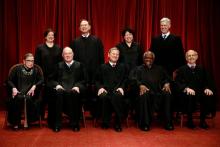Justice Sonia Sotomayor

It may take years to fully grasp the import of the Supreme Court’s decision in Trinity Lutheran Church v. Comer, where the court ruled 7-2 that the state of Missouri had expressly and unjustifiably discriminated against a church by disqualifying it from receiving a public benefit (scrap tire to enhance playground safety) solely because of the church’s religious character.
But here are six initial observations about the ruling:

The Supreme Court has ruled for a Missouri church that claimed religious discrimination after it was refused state funds to improve its playground.
Ruling 7-2, the court on June 26 determined that the state had unfairly denied funds for Trinity Lutheran Church in Columbia under the First Amendment’s free exercise clause.

Senator Jeff Sessions of Alabama recently raised eyebrows during his confirmation hearing for attorney general when he expressed doubts that secular people respected the truth as much as did those with religious convictions. Even as he insisted that there should be no religious tests for holding public office, Sessions was queasy about the potential dangers of the secular worldview.

The Supreme Court offered a further sign that it favors letting employers with religious objections avoid the Obama administration’s so-called contraception mandate.
Over the vehement objection of its three female justices, the court late Thursday blocked the administration from forcing evangelical Wheaton College to sanction insurance coverage for emergency birth control, even though it would not have had to offer the coverage itself.
In doing so, the court made clear that it’s not done with the religious liberty issue following the court’s June 30 ruling that closely-held, for-profit corporations with objections to certain contraception methods do not have to offer this type of coverage to their employees.